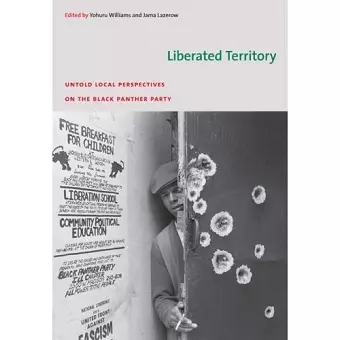Liberated Territory
Untold Local Perspectives on the Black Panther Party
Jama Lazerow editor Yohuru Williams editor
Format:Hardback
Publisher:Duke University Press
Published:12th Jan '09
Currently unavailable, and unfortunately no date known when it will be back

Essays on the Black Panther Party's local chapters.
Focuses on the local manifestations of the Black Panther Party, far away from the Party's Oakland headquarters. This collection examines how specific Party chapters or offshoots emerged, developed, and waned, as well as how the local branches related to their communities and to the national party.With their collection In Search of the Black Panther Party, Yohuru Williams and Jama Lazerow provided a broad analysis of the Black Panther Party and its legacy. In Liberated Territory, they turn their attention to local manifestations of the organization, far away from the party’s Oakland headquarters. This collection’s contributors, all historians, examine how specific party chapters and offshoots emerged, developed, and waned, as well as how the local branches related to their communities and to the national party.
The histories and character of the party branches vary as widely as their locations. The Cape Verdeans of New Bedford, Massachusetts, were initially viewed as a particular challenge for the local Panthers but later became the mainstay of the Boston-area party. In the early 1970s, the Winston-Salem, North Carolina, chapter excelled at implementing the national Black Panther Party’s strategic shift from revolutionary confrontation to mainstream electoral politics. In Detroit, the Panthers were defined by a complex relationship between their above-ground activities and an underground wing dedicated to armed struggle. While the Milwaukee chapter was born out of a rising tide of black militancy, it ultimately proved more committed to promoting literacy and health care and redressing hunger than to violence. The Alabama Black Liberation Front did not have the official imprimatur of the national party, but it drew heavily on the Panthers’ ideas and organizing strategies, and its activism demonstrates the broad resonance of many of the concerns articulated by the national party: the need for jobs, for decent food and housing, for black self-determination, and for sustained opposition to police brutality against black people. Liberated Territory reveals how the Black Panther Party’s ideologies, goals, and strategies were taken up and adapted throughout the United States.
Contributors: Devin Fergus, Jama Lazerow, Ahmad A. Rahman, Robert W. Widell Jr., Yohuru Williams
“Students of American and African American history will find Liberated Territory enlightening and instructive for illuminating the history of a widely understudied and commonly misconstrued organization. The five essays advance the momentum for continued scholarly research on Black Power’s local impact, which is essential for a better understanding of the movement’s diverse character and national appeal.” - Karen M. Hawkins, North Carolina Historical Review
“Yohuru Williams and Jama Lazerow and their contributors challenge the conventional narrative of the 1960s that focuses predominantly on the liberal civil rights movement, to the exclusion of the radical black power movement, and either evades any discussion of the Black Panther party (BPP) or portrays the organization negatively. . . . These narratives demonstrate the importance of local circumstances in Panther history. . . . Liberated Territory makes an important contribution to the growing scholarship on the Black Panther party.”
- Floyd W. Hayes III, Journal of American History
“Anyone interested in the BPP, or in Black Power activism in overlooked places such as Birmingham, will learn a great deal from Liberated Territory.” - Hasan Kwame Jeffries, The Alabama Review
“Liberated Territory helps to decenter the Oakland top-down approach to studying the Black Panther Party by critically engaging with the stories of rank and file party members in locations far beyond Oakland. Yohuru Williams and Jama Lazerow have produced a collection that will quickly become a model for others to emulate.”—Sundiata Keita Cha-Jua, author of America’s First Black Town: Brooklyn, Illinois, 1830–1915
“Liberated Territory is a very impressive anthology. Its focus on the local histories of the Black Panther Party helps to fill a yawning gap in scholarship and adds to the expanding corpus of innovative scholarship on the black power movement. By developing a broader understanding of the party’s local chapters, people, and politics, the essays shed light on the provincial nature of the party while providing important context for understanding the national organization.”—Jeffrey O. G. Ogbar, author of Black Power: Radical Politics and African American Identity
“Anyone interested in the BPP, or in Black Power activism in overlooked places such as Birmingham, will learn a great deal from Liberated Territory.” -- Hasan Kwame Jeffries * Alabama Review *
“Students of American and African American history will find Liberated Territory enlightening and instructive for illuminating the history of a widely understudied and commonly misconstrued organization. The five essays advance the momentum for continued scholarly research on Black Power’s local impact, which is essential for a better understanding of the movement’s diverse character and national appeal.” -- Karen M. Hawkins * North Carolina Historical Review *
“Yohuru Williams and Jama Lazerow and their contributors challenge the conventional narrative of the 1960s that focuses predominantly on the liberal civil rights movement, to the exclusion of the radical black power movement, and either evades any discussion of the Black Panther party (BPP) or portrays the organization negatively. . . . These narratives demonstrate the importance of local circumstances in Panther history. . . . Liberated Territory makes an important contribution to the growing scholarship on the Black Panther party.”
-- Floyd W. Hayes III * Journal of American History *
ISBN: 9780822343431
Dimensions: unknown
Weight: 549g
312 pages